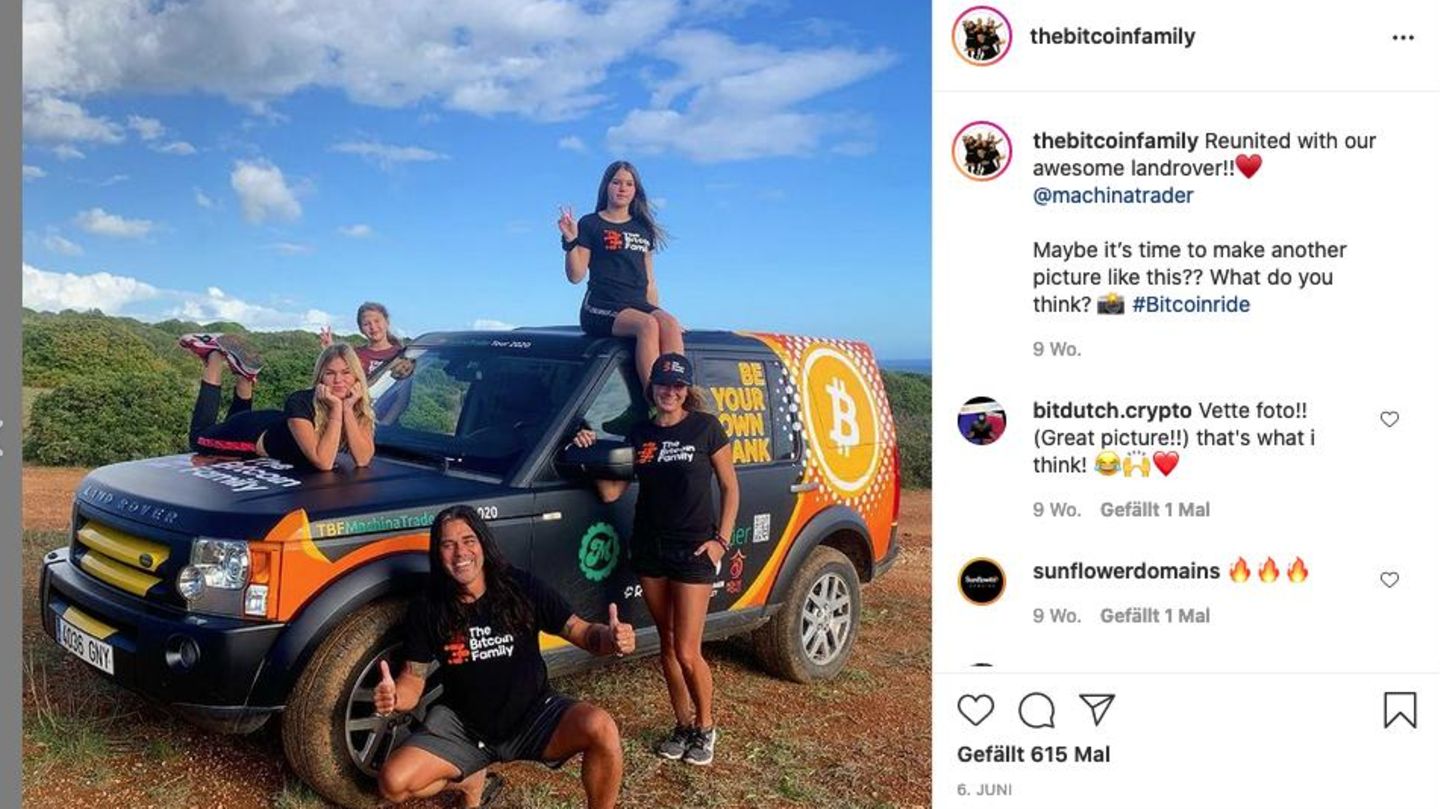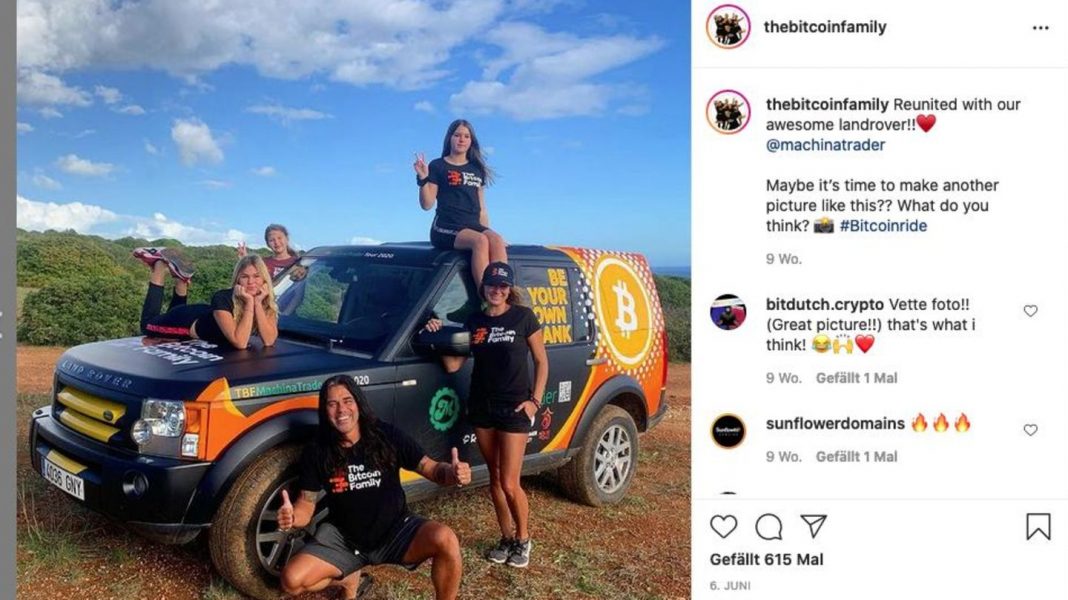The Bitcoin Family
One family sold everything and bet on Bitcoin, now hiding their wealth around the world

The Bitcoin Family documents its history on numerous platforms such as Instagram
Didi Taihuttu-Instagram
They put everything on one card – and found freedom. A family from the Netherlands gave up their old life and invested all their belongings in Bitcoin. Now the crypto millionaires are traveling around the world. And hide their money on the way.
It was a single decision that was to turn the lives of Didi Taihuttu, his wife and their three daughters from scratch. When Bitcoin slowly but surely rose in 2017, they decided to go all out – and put all their assets, including the house, into the cryptocurrency. The bet went up. Now the family documents their journey around the world. And told how to protect your assets from foreign access.
“We thought: just sell it all. What do we have to lose?”, the Bitcoin millionaire already explained to the “CNBC”in 2017. Everything, that was really all the family owned. The well-run company, the house, three cars and a motorcycle, reports Taihuttu. The bet went up. The then 39-year – old bought Bitcoin when they cost just $ 900-and a few months later shot up towards $ 20,000 for the first time. Even the following crash below $ 3000 a few months later did not stop him. “When Bitcoin went down again, we bought even more,” Taihuttu rejoiced in a follow-up interview last year.
Since then, the price has gone up steeply again, scratching the $ 60,000 mark for the first time in March 2021. The family had increased their fortune more than sixty-fold. However, she does not reveal how high it is exactly. The family is otherwise extremely open with their lives: On their own Youtube channel they share very freely insights into their everyday life.
Bitcoin brings freedom
But the Taihuttus are not concerned with the money anyway. “It means freedom, “he said in a conversation with the Washington Post, which accompanied him to a tattoo appointment where he had the Bitcoin logo engraved. “Yes, we no longer have the three cars and the motorcycle. But in the end we are happy as a family and enjoy life.”
But he had to convince his wife Romaine of this. “I was shocked. I wondered: what the hell are Bitcoin and cryptocurrencies. It was quite a lot for me, “she reports “CNBC”. “But after working my way into it, I realized that it would be a good change for our lives. For my children, my husband and for myself.”Since they switched their lives to Bitcoin, the family has been living in a single world trip. 40 Countries have visited them in the last four years, had lived in tents, campers and tenements and exclusively on Bitcoin. And even partly literally.
He never wanted to bet on banks again, according to the convinced Bitcoin fanatic. Even the first money came from Bitcoin. “We waited until a person was ready to exchange for Bitcoin.”For one person, they would even have installed an app to store the currency on their smartphone in order to then be able to exchange the digital coins for cash. Only in the Italian village of Rovereto and the Slovenian capital Ljubljana could they have paid anything with Bitcoin. “I always said I don’t go to the hairdresser until I can pay with Bitcoin there. And then all of a sudden it was possible and I thought: I really need a haircut,” laughs Taihuttu.
Protection against hackers
To protect their money, the family has distributed it around the world. “I have hidden hardware wallets in several countries, so I never have to fly far to be able to get money out of my cold wallet and go out of the market,” the crypto traveler explains. Wallets are the digital wallets in which cryptocurrencies are stored. So-called hot wallets are connected to the Internet or even directly in the cloud, cold wallets are those that are disconnected from the network for security reasons. Often these are specially prepared storage media that are password-protected, a so-called hardware wallet.
According to Taihuttu, the hidden wallets store copies of coins, which account for almost 74 percent of the family’s wealth. The remaining 26 percent are stored “hot”, so they are directly available for the family. They are “risk capital,” jokes Didi. On the one hand, the family pays for their everyday life, on the other hand, he invests them again and again in order to be able to make a quick deal. For example, when the Dogecoin boomed in the spring and he was able to make a nice additional profit.
With their cold wallets, the family wants to protect themselves from the danger that always dominates the headlines: that hackers crack online wallets and snatch the coins under the nail. Just as it happened on Monday with coins worth 510 million euros. Then you could leave the money in the bank right away, finds Taihuttu. But it was precisely this distrust of these institutions that ultimately drove him to Bitcoin. “What if the companies go bankrupt?”, he replied to the “CNBC” when asked if he had deposited his hardware wallets at banks or post offices. “Then what about my Bitcoin? Can I get to you? Then you have to put your capital back in the hands of a central organization.”
Well hidden assets
Instead, he preferred to hide them himself, two each in Europe and Asia, one in South America and one last in Australia. Thus, he can always take a short trip to his coin treasure to make money in a market crash, he explains his strategy. As a classic treasure with a map, however, he has not hidden them, they are in rented apartments, with friends or in rental warehouses. “I prefer to live in a decentralized world where I myself am responsible for protecting my money.”Even if he then has to get on the plane to get his money.
Source:CNBC 1, CNBC 2, Washington Post, Youtube



